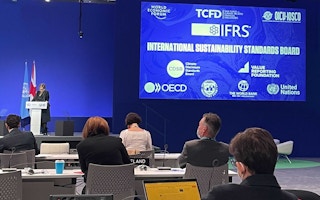One of the more significant announcements at the COP26 meetings in Glasgow in November concerned the International Financial Reporting Standards (IFRS) Foundation’s launch of a sustainability standards board.
The creation of the International Sustainability Standards Board (ISSB) has been in the pipeline for a while, but at COP26, it was announced that the Value Reporting Foundation and the Climate Disclosure Standards Board will be consolidated into the new board. The former is made up of both the Sustainability Accounting Standards Board (SASB) and the International Integrated Reporting Council (IIRC).
This means that four of the top five sustainability reporting organizations in the world are now working in a coordinated way on a benchmark reporting standard. With backing from the accounting profession, the new board’s absorption of several leading reporting standards bodies, along with favourable reception of it by governments and financial regulatory bodies, as well as the involvement of the World Economic Forum (WEF), the ISSB will likely become the leading standard for sustainability reporting, and the basis for mandatory reporting in many jurisdictions.
It will be important to watch how this unfolds. Organisations that have been consolidated into the new board have emphasised their role in investor-focused sustainability disclosure, driven by a responsibility to ensure good information and to minimise risk to lenders, investors and insurers. This is in keeping with the IFRS Foundation’s role as a body set up to promote the reporting of information that could potentially create or erode enterprise value.
For a company to report to investors, lenders or insurers is, however, only part of the picture. There is a wider role that the new board plays when it comes to creating mechanisms to enable responsible corporate conduct towards the environment and society.
Investor focus vs public concerns
For example, regulators, consumers and the society at large need to know every company’s impact on environmental and social wellbeing. A company’s poor conduct might not affect its financial returns either in the short or long run, even as what it does is deemed unacceptable in the realm of sustainable development. There is evidence to prove this, as poor corporate conduct on environmental and social matters can sometimes be rewarded with higher corporate profits or higher investment returns, at the expense of the deterioriation of planetary resources and social equity. It is common because of society’s systemic failure to internalise environmental and social costs.
The European Union (EU)’s Sustainable Finance Disclosure Regulation, adopted in 2019, currently requires investors to disclose not only risks to themselves, but also their adverse impacts on both the planet and society. This “double materiality” concept acknowledges that risks and opportunities can be material from both a financial and non-financial perspective. Double materiality recognises that companies and financial institutions must manage and take responsibility for the actual and potential adverse impacts of their decisions on people, society and the environment.
The EU Green Taxonomy and Guidelines on Reporting Climate-Related Information confirm double materiality as the basis for comprehensive non-financial information disclosure. The EU’s Corporate Sustainability Reporting Directive (CSRD), scheduled for implementation in 2023, will also incorporate the concept of double materiality.
Decision time for corporate disclosure
The European Financial Reporting Advisory Group (EFRAG)‘s Project Task Force, which is leading the technical work in developing CSRD standards, announced a Statement of Cooperation with the Global Reporting Initiative (GRI) in July 2021. The GRI is the most widely used ESG reporting standard in the business world, but it has not been consolidated into the ISSB. The application of ‘double materiality’ has always been a central theme for GRI since its inception, largely due to the fact that its development is based on a multi-stakeholder approach, in which trade unions and civil society groups hold significant influence.
Hence, as ISSB moves to the centre stage, one question needs to be answered: should sustainability reporting largely become a tool for investors to minimise risk and seek financial opportunities, or should it serve as a deeper indicator of corporate responsibility, ensuring that companies act in the broader, long-term interests of society? Will governments and regulatory bodies adopting ISSB as a reporting standard be ready to ensure that companies account for their impact on the wellbeing of all, or simply the wellbeing of their investors?
If ISSB is contemplating a weakened version of double materiality, this may encourage a migration from GRI to ISSB reporting standards. The business sector could be both sending and receiving the wrong signal, that a company’s impact on the environment and society are secondary considerations compared to the environment’s financial impact on a company.
John Sayer is the director of Carbon Care Asia (CCA). The op-ed is published in the 2021/12 and 2022/01 issues of CCA Insight.











